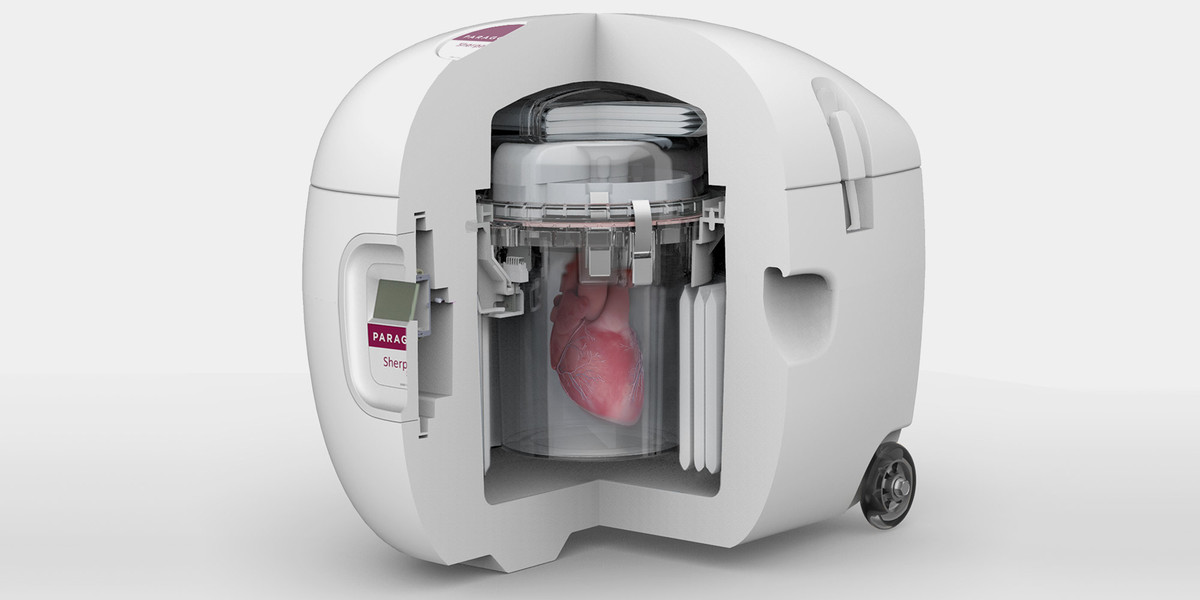Loyola Medicine Performs Illinois' First Heart Transplant with New Transportation Technology
November 15, 2021
Categories: Transplant
Tags: Transplant
MAYWOOD, IL – Loyola Medicine has completed Illinois' first heart transplant using a newly developed cardiac transport system. The Paragonix SherpaPak® System aims to change the way hearts are transported during transplant, utilizing a canister that monitors temperature rather than packing the heart in ice.
Since the first successful heart transplant in the late 1960s, donor hearts have been preserved during transportation in a preservation solution in a cooler filled with ice. When longer trips are required to retrieve donor organs, this method runs the risk of freezing the donor heart. Studies have shown the unpredictable cooling caused by rapid temperature decrease may have detrimental effects on the integrity of the donor heart.
"We're very excited to be the first in Illinois to utilize this technology," said Edwin McGee Jr., MD, FACS, surgical director of heart transplantation and ventricular assist device program at Loyola Medicine. "Allocation of donor hearts changed in 2018 to prioritize sicker patients, often meaning longer procurement runs. The SherpaPak can mitigate some of the risk associated with longer ischemic times."
The Paragonix SherpaPak® is a lightweight shipper system for donor organs that provides a consistent, stable thermal environment for over 40 hours. According to Paragonix, the SherpaPak's initial data shows a 54% decrease in severe primary graft dysfunction and a 28% decrease in the length of stay in the ICU as compared to heart transplants using the traditional transportation method. (D’Alessandro et al., The Journal of Heart and Lung Transplantation 2021, Volume 40, Issue 4, Supplement , S127, April 01, 2021)
Using the SherpaPak for transportation of the donor heart, there was no wait time for the heart to warm up. "The heart jumped right into action," said Dr. McGee. In recovery, the patient required less of the medicine needed to wake up the heart, and almost no medication to keep it moving.
Dr. McGee has consistently been at the forefront of new technology to help patients with cardiovascular diseases and conditions. He was the first surgeon in North America to implant two HeartWare® continuous flow ventricular assist devices in one patient – one device in each ventricle. Dr. McGee said, "We're always looking to make heart transplants safer and better. To be a part of the first transplant in Illinois using this technology is incredibly rewarding."
Images of the Paragonix SherpaPak® and footage of Dr. McGee are available via this Dropbox link. An additional animation of the device can be found on YouTube.
About Loyola Medicine
Loyola Medicine, a member of Trinity Health, is a nationally ranked academic, quaternary care system based in Chicago's western suburbs. The three-hospital system includes Loyola University Medical Center (LUMC), Gottlieb Memorial Hospital, MacNeal Hospital, as well as convenient locations offering primary care, specialty care and immediate care services from nearly 2,000 physicians throughout Cook, Will and DuPage counties. LUMC is a 547-licensed-bed hospital in Maywood that includes the William G. and Mary A. Ryan Center for Heart & Vascular Medicine, the Cardinal Bernardin Cancer Center, the John L. Keeley, MD, Emergency Department, a Level 1 trauma center, Illinois's largest burn center, the Nancy W. Knowles Orthopaedic Institute, a certified comprehensive stroke center, transplant center and a children’s hospital. Having delivered compassionate care for over 50 years, Loyola also trains the next generation of caregivers through its academic affiliation with Loyola University Chicago’s Stritch School of Medicine and Marcella Niehoff School of Nursing.
Established in 1961, Gottlieb Memorial Hospital is a 235-licensed-bed community hospital in Melrose Park that includes the Judd A. Weinberg Emergency Department, the Loyola Center for Metabolic Surgery and Bariatric Care, Loyola Cancer Care & Research at the Marjorie G. Weinberg Cancer Center, acute rehabilitation, a transitional care center, childcare center and fitness center. Founded in 1919, MacNeal Hospital is a 349-licensed-bed teaching hospital in Berwyn with advanced medical, surgical and psychiatric services and a 68-bed behavioral health program.
For more information, visit loyolamedicine.org. You can also follow Loyola Medicine on LinkedIn, Facebook, Instagram or X (formerly known as Twitter).
About Trinity Health
Trinity Health is one of the largest not-for-profit, faith-based health care systems in the nation. It is a family of 127,000 colleagues and more than 38,300 physicians and clinicians caring for diverse communities across 26 states. Nationally recognized for care and experience, the Trinity Health system includes 93 hospitals, 107 continuing care locations, the second largest PACE program in the country, 142 urgent care locations and many other health and well-being services. In fiscal year 2024, the Livonia, Michigan-based health system invested $1.3 billion in its communities in the form of charity care and other community benefit programs. For more information, visit us at www.trinity-health.org, or follow us on LinkedIn, Facebook, and X (formerly known as Twitter).
